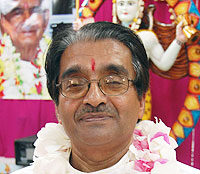An interview with Paramacharya of SWAHA, Pt. Hardeo Persad, on 90.5 FM.
- Sometimes people only pray when things go wrong. Is it that it’s just the way things were supposed to go to get you to that point of prayer?
- We all drink of the poisons of materialism, not realising that we leave everything here when we go. We carry nothing with us after death. We must tap into our own divinity and spirituality here and now. Humans are not supposed to be in pain or grief. Our true nature is Brahmananda, the bliss of the Self. We suffer because we move away from that norm of spirituality.
Humans are like a square with four angles: physical, social, mental and spiritual. To live a balanced life, all four angles must be in balance. If a square is twisted, only one angle needs to be adjusted and all the other angles will be right. In humans, the angle that is in need of fixing is the spiritual angle. As we get older, and the spiritual angle increases, the square might transform into a rhombus (a diamond-shaped figure) as we tap into our divinity.
Praying is essential. We should inculcate this in our children and grandchildren. This means praying together with the right spiritual values so as to avoid fanaticism in religion. We must teach them so that they can cope with life in the future and to create a better society. Each person is divinity embodied but we are obstructed, from experiencing the Self by the illusion of individuality and the limitations of place, time, attachment, knowledge and creativity. We must realise that we are complete beings in our divinity.
SWAHA was formed because we believe in enlightened ritualism. Everything we do, all rituals, have a deeper meaning. Mantras and chakras are connected to powerful sound vibrations. The Shiv Puraan says that the letters of the Sanskrit alphabet relate to a particular point of the body. When we chant mantras, we create a beneficial energy flow inside us.
There is deep significance to offering jal (water) to the sun every morning. We use a lota made of brass, which is an excellent conductor. It is similar to a battery with electrolytes, and positive and negative poles. When it is connected, electricity flows. The lota is shaped in such a way that your hand can hold it perfectly. From the point of view of reflexology, there are nerve endings in the palms of the hands. Using both hands to hold the lota, completes a circuit. The water or milk is similar to the electrolytes. In the early morning hours, the atmosphere is filled with praana or vital energy. We chant mantras as we offer jal, which creates an internal movement. Electricity flows as we offer the jal. As we lift the offering, it draws energy from the atmosphere and energises the mind and body. Everything in Hinduism has such depth of meaning; everything in the world is related to the human body: Yatha pinde; tatha Brahmande, “As in the microcosm, so in the macrocosm.”
- So, is it all related to karma?
- Karmas play the most instrumental role in everything that we do. Some people may argue that we can’t change karma. Karma creates our destiny, which we have to work out. The only way we can avoid this is if you adapt the attitude of sharanaagati, unconditional surrender to the Divine Absolute Power. Then, nothing can affect us. While we live with a sense of individuality, the sense of ‘I’, karmas are going to bind us. This is why we must perform all these religious karmas, to build that protective shield around us.



